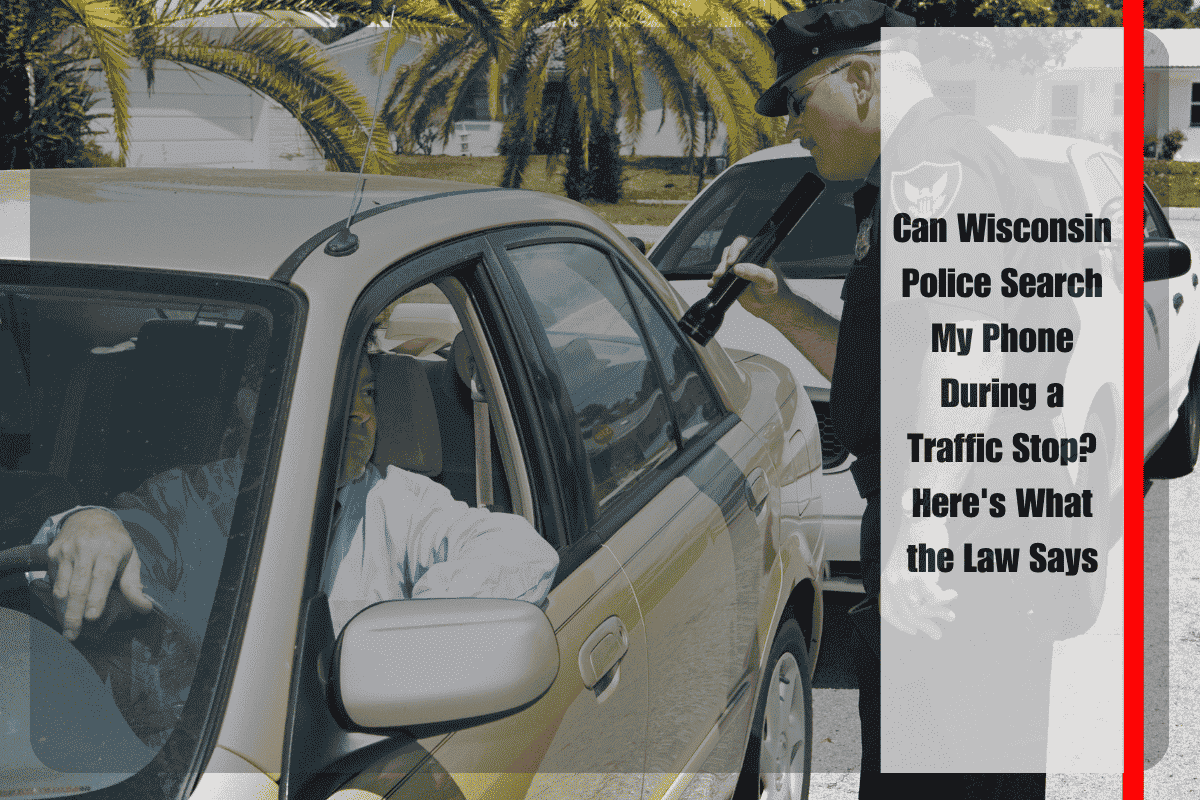If you’ve ever been stopped by the police in Wisconsin, you might have wondered if they have the right to search your phone during the encounter. Given how much personal information our phones store, this is a valid concern. The short answer is: no, police generally cannot search your phone without a warrant or your consent. However, there are certain circumstances and legal exceptions where a search might be allowed. Here’s what you need to know about your rights when it comes to phone searches during a traffic stop in Wisconsin.
Your Rights Under the U.S. Constitution
Under the Fourth Amendment of the U.S. Constitution, citizens are protected from unreasonable searches and seizures. This means that, in most cases, law enforcement cannot search your phone or other personal items without a warrant or your consent. For a police officer to search your phone during a traffic stop in Wisconsin, they would generally need probable cause or a warrant.
Can Police Search Your Phone Without a Warrant?
In most situations, police need a warrant to search your phone. This is because phones store a lot of sensitive personal information, such as photos, messages, emails, and app data, all of which are protected by your privacy rights. In 2014, the U.S. Supreme Court ruled in Riley v. California that police cannot search a suspect’s cellphone without a warrant, even if they have arrested the individual. This decision protects your phone from being searched without consent or a legal order.
However, there are some exceptions where a police officer might be able to search your phone without a warrant, especially during a traffic stop. Here are a few of those scenarios:
Consent
If you consent to the search of your phone, the police can go ahead and look through it. Consent must be given voluntarily, and you have the right to refuse. Police cannot force you to give consent. If they ask to search your phone, you can politely decline. You’re under no obligation to agree to a search, and it’s often best to exercise your right to refuse if you’re unsure of the consequences.
Probable Cause and Exigent Circumstances
In some cases, police may be able to search your phone without a warrant if they have probable cause or if there are exigent circumstances. For example, if the police suspect that your phone contains evidence related to a crime, or if they believe the phone might contain information that could harm someone or be destroyed, they might argue that an immediate search is necessary.
However, this is a narrow exception, and police generally need specific evidence to justify why they should search your phone without a warrant. In the absence of probable cause or exigent circumstances, a search of your phone would be considered a violation of your Fourth Amendment rights.
Search Incident to Arrest
If you’re arrested during a traffic stop in Wisconsin, the police may have the right to search you and your immediate surroundings as part of a search incident to arrest. This typically includes checking your pockets or other areas within your reach for weapons or evidence that could be destroyed. However, this does not automatically give the police the right to search your phone. The Riley v. California ruling made it clear that a search of your phone requires a warrant or consent, even if you’re arrested.
When Can Police Legally Take Your Phone?
There are some instances when police may take your phone as evidence, but they still cannot search it without a warrant. For example, if the police believe your phone contains evidence of a crime (like text messages, emails, or photos), they may seize the phone and apply for a warrant to search it. If a judge grants the warrant, the police can then search your phone legally.
What Should You Do If the Police Ask to Search Your Phone?
If a police officer asks to search your phone during a traffic stop, remember that you have the right to refuse. You should stay calm and polite, and simply tell the officer that you do not consent to the search. For example, you could say, “I do not consent to a search of my phone”. This statement clearly asserts your rights without escalating the situation.
If the police do search your phone without your consent or a warrant, you can challenge the search in court. Any evidence obtained illegally may not be admissible in court.
In Wisconsin, police cannot generally search your phone during a traffic stop without your consent or a warrant. The Fourth Amendment protects your privacy rights, and in most cases, a phone search would be considered illegal without one of these two conditions. There are exceptions, such as consent, probable cause, or exigent circumstances, but these are limited and must meet specific legal criteria. To protect your rights, always remember that you can refuse consent for a phone search, and you should never feel pressured to agree.
Sources
[1] https://thewrangler.com/can-wisconsin-police-search-my-phone-during-a-traffic-stop-heres-what-the-law-says/2025/07/01/
[2] https://www.oflaherty-law.com/learn-about-law/your-rights-in-wisconsin-when-pulled-over-in-a-traffic-stop
[3] https://docs.legis.wisconsin.gov/document/statutes/968.24
[4] https://oshkoshlawyers.org/empowering-drivers-explaining-your-rights-in-a-traffic-stop/
[5] https://eisenberglaw.org/blog/can-a-police-officer-search-my-car-during-a-wisconsin-traffic-stop/












